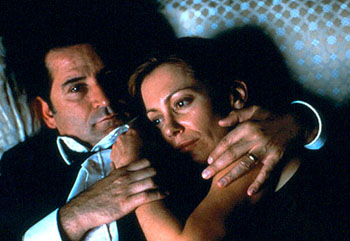![[Metroactive Movies]](/movies/gifs/movies468.gif)
[ Movies Index | Show Times | Silicon Valley | Metroactive Home | Archives ]
Sticky Thicket A guilty cop (Anthony LaPaglia) and his wife (Kerry Armstrong) struggle with strains that threaten their marriage in 'Lantana.'
Marital Law
'Lantana' wanders in dramatic underbrush
By Richard von Busack
FOR DAVID LYNCH, it's the tulips; for Sam Mendes, director of American Beauty, it's the too-red roses; for P.T. Anderson, it's the sweet, corrupt flower of the magnolia. And for director Ray Lawrence, it's the lantana, a weedy, sprawling plant, an unkillable perennial that blooms into pretty but insignificant flowerets. We may be working our way down the botanical chain.
Lantana, a kind of Australian Beauty, examines the suspicions, lies and betrayals in a series of suburban Sydney marriages. Barbara Hershey plays Dr. Valerie Somers, a psychiatrist who needs to heal herself. She's made a public show of grieving, through a celebrated autobiographical book about the murder of her daughter. Yet her home life with her husband, John (Geoffrey Rush), is walled in by bitter silence. When Valerie disappears late one night, John is at first the natural suspect. On the case is police detective Leon Zat (Anthony LaPaglia, an actor always capable of emoting Nixonian levels of self-suppression and guilt). Leon has something to feel bad about. Though married with children, he has succumbed to a tryst, and his wife, Sonja (Kerry Armstrong), has been informed of his transgression.
Ripples of strong emotions rush through the film. Note the sting in Rush's voice when he susses out a similarly wounded husband in the form of the policeman interrogating him: "You look bereft, Leon." Do you suppose there are people who go to a movie just to see Geoffrey Rush? There ought to be. And Lantana is good at pegging how infidelity can be a vicious spiral. A married soul, neglected or taken for granted, becomes lonely and seeks someone new. But after finding that someone, the soul harbors a guilty secret that makes it all the lonelier. Lantana demonstrates this algebra of need. Yet the film saves all its sympathies for the betrayed and offers little for the betrayers.
Lantana states the obvious: "We don't know what to feel anymore, what's right or wrong anymore." There's a certain lecturing undertone here, a sense that we really need to face what a crime it is that people lie to their spouses. Hershey's Somers, for instance, is shaken to the core by one of her cases: a homosexual patient who is sleeping with a married man. She'd been a psychiatrist for decades, and she'd never heard of such a thing? Neither the upper-class characters (Rush and Hershey) nor the middle-class ones (LaPaglia and Armstrong) possess truly sturdy, angry emotions. Take two peripheral characters: the nurse Paula (Daniella Farinacci) and her unemployed husband, Nik (Vince Colosimo). When Nik asks Paula what she'd do if he strayed, she tells him, "I'd cut your balls off." Director Lawrence sympathizes with this rawness and bluntness. Those qualities are obviously more real to him than the less easily stated feelings in the other two marriages. If you can't get into the film's mood of wondering shock at adultery, Lantana may seem as brittle and attenuated as the plant it's named after.
[ Silicon Valley | Metroactive Home | Archives ]
![]()

Photograph by Elise Lockwood
Lantana (R; 121 min.), directed by Ray Lawrence, written by Andrew Bovell, photographed by Mandy Walker and starring Anthony LaPaglia, Barbara Hershey and Geoffrey Rush, opens Friday at the Los Gatos Cinema in Los Gatos and the CinéArts in Palo Alto.
From the January 17-23, 2002 issue of Metro, Silicon Valley's Weekly Newspaper.